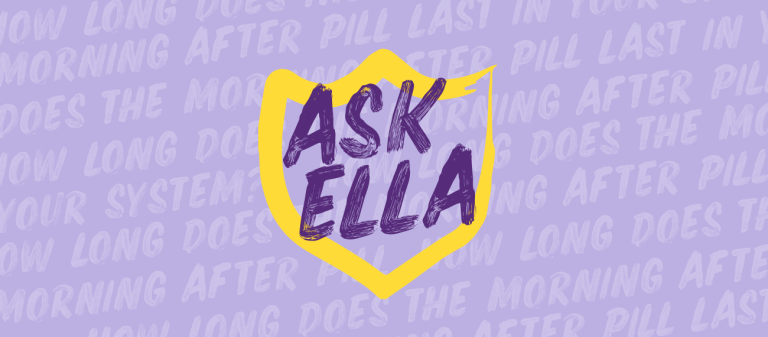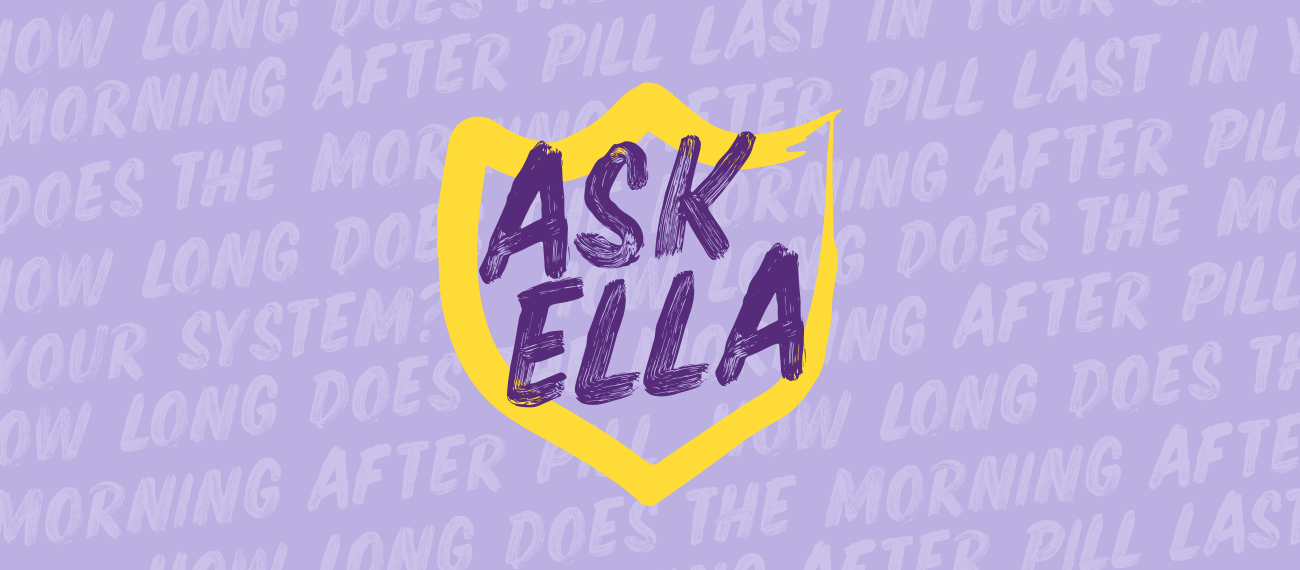“How do I know if the morning after pill has worked?”
“Will the morning after pill work if I’ve already ovulated?”
“How long does the morning after pill last in your system?”
Many of you have got in touch with us over the years to ask us questions about the morning after pill. We’ve answered many of your questions already in our ‘Ask Ella’ series, so head over there after reading this if you want to find out more about how emergency contraception works, or if you’re looking for digestible info about how pregnancy works, why periods are painful, what happens at a cervical screening and other topics around sex and bodies.
One question we are often asked is how long does the morning after pill last in your system. Some people may be asking this because they want to know if hormonal emergency contraception will delay their period, whilst others might want to see if the morning after pill will protect them from more than one incident of unprotected sex. Maybe you’re just curious about how long the morning after pill lasts in your system out of sheer curiosity.
Whatever your reason for being here, we will do our best to answer your question. To get a better understanding of how it all works, we spoke to Deborah Evans, a pharmacist with over 30 years of experience.*
How does the morning after pill work?
The morning after pill can prevent pregnancy if taken within 5 days of unprotected sex, although it is most effective when taken as soon as possible. It works by delaying ovulation, holding back the release of the egg so that any sperm which has made its way into your vagina won’t have anything to fertilise.
It’s really hard to pinpoint the exact point of ovulation – even if you are dedicated to tracking your periods each month – because it can vary from month to month and from person to person. Even if you don’t think you’re going to ovulate for a while, it’s important to note that whilst ovulation only occurs for 12-24 hours, sperm can live inside your body for up to 5 days, so if you had unprotected sex a few days before you were due to ovulate there’s a chance you could still get pregnant.
What is the morning after pill’s ‘half life’?
“Any medicine that’s taken has something called a half-life, which is the amount of time it takes for the concentration of the medicine in your blood to reduce by 50%,” says Deborah.
This isn’t an exact science, because different people metabolise things at different rates. How quickly you metabolise substances depends on loads of factors like your age, body size and composition, physical activity and so on. We can’t say with 100% – or even 80% – certainty when the morning after pill will have reached its ‘half-life’ in your blood because everyone is different. So what can we tell you?
“A single 30mg dose of ulipristal acetate is estimated to be around about 32 hours, plus or minus six hours,” says Deborah. “So essentially, that means that its concentration should be reduced by half within that time. That doesn’t mean it’s completely eliminated from your body, however, because then it takes another 32 hours to half it again and so on until it’s completely cleared by the body.”
So what does this mean? One thing to note is that the morning after pill is only effective for a single episode of unprotected sex. It is designed to be used in an emergency, after contraceptive failure or unprotected sex. The morning after pill will not continue to protect you from pregnancy if you take it and then have unprotected sex again. As a side note, the morning after pill is intended for emergency use only and not intended as a regular contraceptive option.
“No one person is the same,” says Deborah. “We don’t all fit into one neat box when it comes to our metabolism and how quickly we clear medicine. Having more fat or compromised kidney or liver function that affects the metabolism of drugs would all have an impact.”
The bottom line
The morning after pill has one job to do: prevent unplanned pregnancy by delaying ovulation so that any sperm lingering in your body will have died off before the egg is released.
Emergency hormonal contraception does not ‘stay’ in the body, it does not affect your long-term fertility (remember, it won’t protect you against future incidents of unprotected sex), and will not be effective if you have already ovulated as its one job is to delay ovulation.
We hope this has helped answer your question. If you have any queries about topics we haven’t covered yet, please get in touch on social @ellaoneuk. If you have taken the morning after pill in the past, why not share your experience below?
*Deborah Evans does not endorse any products or brands.
** verify at ellaone.co.uk/verify
ellaOne® 30mg film-coated tablet contains ulipristal acetate and is indicated for emergency contraception within 120 hours (5 days) of unprotected sexual intercourse or contraceptive failure.




